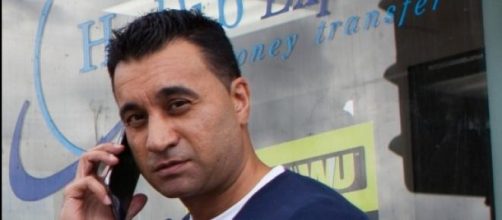For Saqib Mumtaz 1989 should have been a defining year; he should have earned a BTEC in Business at a college in Manchester before heading off to university and a good career. Instead he was about to drop out completely and never look back.
After all, on the streets of Manchester's notorious Cheetham Hill a degree wouldn't stop you catching a bullet, nor pay for a Porsche before you were old enough to shave. Scamming credit cards, on the other hand, just might. What began with four teenage pals committing petty fraud to buy designer clothes would, however, have consequences none could have imagined.
It would see them fly business class for breakfast in New York when it was raining in Manchester. It would see the Armani store in Thailand close so they could shop in private. It would see them using the credit cards of movie stars, royalty and bankers. It would also eventually see them in prison and Saqib, at least, in the movies.
The film, Plastic, starring Ed Speleers, Will Poultier, Alfie Allan and Sebastian De Souza as Saqib, was directed by Justin Gilbey and released in April last year. In it, the friends are threatened by a European gangster played by Thomas Kretschmann after they had 'skimmed' his card.
According to Saqib, however, that never happened: "The guy was Saudi, not European," he explains over lunch.
"And he wasn't gangster." Good to know. "He was an arms dealer." Less good to know; it occurs that I am chit-chatting away with a guy who has very powerful enemies. "Adnan…something or other he was called. The guy was rich we figured he could stand to lose a few quid."
They were not wrong. At one point, Adnan Khashoggi was widely believed to be the richest man in the world. And he wasn't just an arms dealer. He brokered weapons deals between governments major governments. Calling Kashoggi an arms dealer is like saying Elvis Presley was a guy who liked to sing in the shower. He was implicated in the Iran Contra scandal with whispers he was involved in the decision to topple Saddam Hussein.
This is the man arms dealers tell their children stories about at bedtime.
"I can't really remember what we bought," he continues, apparently unconcerned. "I had a BMW though, and some Fabergé stuff we sold to some Russian gangsters."
I was a far cry from a few years earlier, when they were buying consumer goods on the high street to sell cheap on the back streets. "If I was short of cash I'd order two hundred of the latest mobile phones. I'd have a cab collect the gear and drop it off in Cheetham Hill.
"Everyone was happy because everyone got paid; the shop was paid on the card, the cabbies earned a week wages in ten minutes, the owner of the card was insured and the credit company was covered.
It was ridiculous."
Then Saqib met a girl who worked at American Express. She began feeding them information and soon the stakes quickly got high. The four friends would fly to New York for breakfast, buy armfuls of Rolex watches and fly back the next day. With each success they edged ever closer to their biggest scam of all: the theft of up to £5 million in never to be recovered diamonds from exclusive Hollywood store, Bijan.
Impersonating Prince Abdullah of Brunei, Saqib ordered the diamonds over the phone and chartered a private jet to bring them and Bijan director, Mosen Bosough, to London. Sparing no expense a fleet of Rolls Royce' with fully liveried drivers met him at the airport.
They booked a suite of rooms at London's Churchill Hotel and then, as the unsuspecting American waited nervously to greet the 'Prince', the diamonds snatched from his hands and never seen again.
It would take two years and an extensive global manhunt before Saqib Mumtaz, Khawar Zaman, Omar Ayub and Mohamed Awan would face justice. Sentenced to a total of seven years in some of Britain's toughest prisons, the ride was finally over.
With the friends now scattered and trying to live normal lives, there remain many questions unanswered and still more that Saqib refuses to talk about. As we shake hands following lunch there is one more question I have to ask: What did happen to the diamonds, really?
"Like I told the cops," Saqib says with grin, "Russian Mafia robbed us."
As I head to my car through the grey Manchester drizzle, I can't forget that mischievous little grin. Nor can I shake something he had said over lunch: "Luckily the Proceeds of Crime Act didn't come in for another two years."

